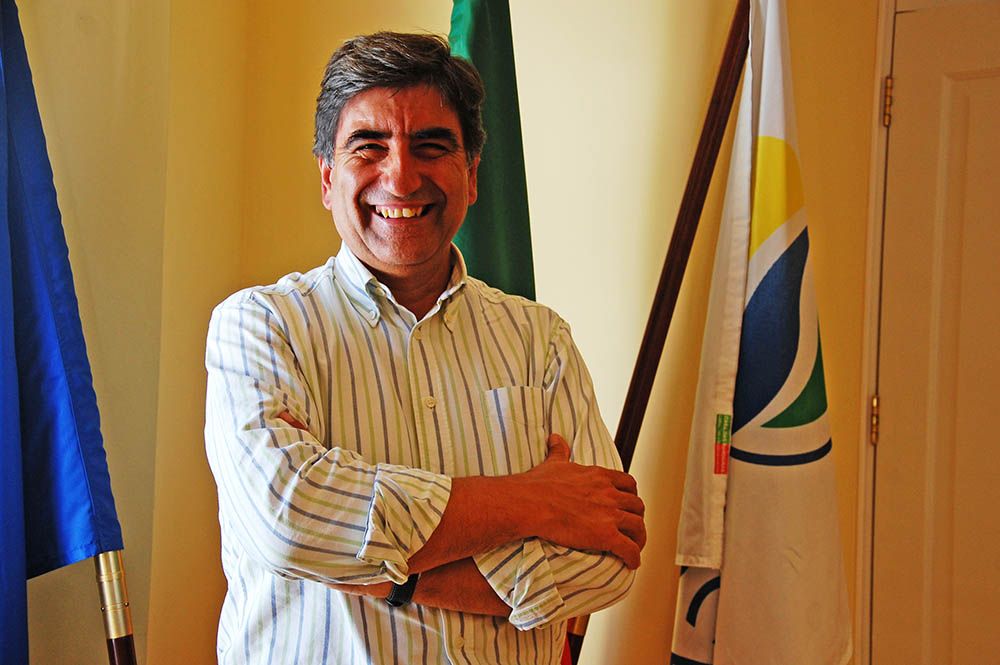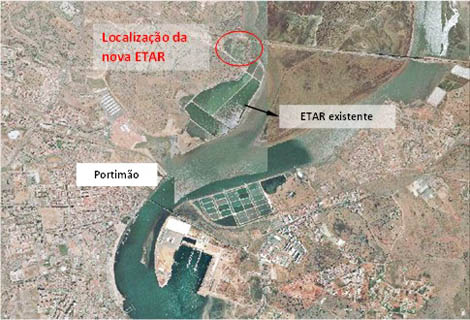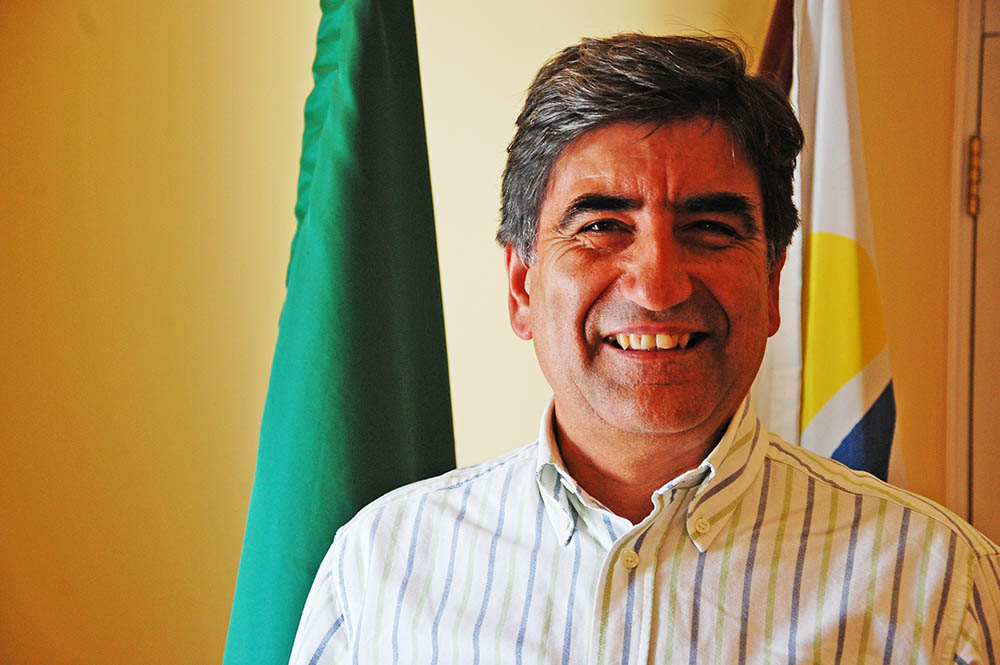 The new Wastewater Treatment Plants (WWTP) of Companheira, in Portimão, and of Faro-Olhão, which represent a global investment of 30 million euros by the company Águas do Algarve SA, are about to start their works.
The new Wastewater Treatment Plants (WWTP) of Companheira, in Portimão, and of Faro-Olhão, which represent a global investment of 30 million euros by the company Águas do Algarve SA, are about to start their works.
In the first interview he has given to a media organization since taking office in July as executive chairman of Grupo Águas de Portugal, Carlos Manuel Martins revealed that the most advanced process is that of the new Partner's WWTP, which will serve the municipality of Portimão, but also the neighbors of Lagoa and Monchique.
This new infrastructure, as revealed in an interview with Sul informação, «at this moment, it is only conditioned by the administrative component: the set of resources in the public procedure that, in some way, disturbed the normal progress of the works, which, under normal conditions, would already be starting».
Anyway, Carlos Manuel Martins hopes that «the work can still start during the year 2015, in December».
As regards It's late Faro-Olhão, the process is, for the time being, going as planned: «the proposals were delivered about two months ago», and the «evaluation of the proposals submitted by the competitors» is now underway.
"We hope that, if all goes well, a winner of this competition can be nominated during the next month of November." And, "if the procedure continues within normal limits", that is, if there are no more complaints from competitors, as happened in Portimão, the president of Águas do Algarve hopes that work can start "in the first quarter of 2016".
One of the issues that has not yet been fully defined regarding the Companheira's WWTP is the possibility that it will receive and treat the effluents from the swine farms in the Serra de Monchique. Carlos Martins is very cautious in this matter and emphasizes that «this is an issue that, not being the responsibility of the concession itself, if any connection occurs, the WWTP will never be able to receive such effluents without these pig farms promoting prior treatments».
 And he emphasizes: “the treatment plant will not be in technical conditions to receive the raw effluents from the agro-industry”.
And he emphasizes: “the treatment plant will not be in technical conditions to receive the raw effluents from the agro-industry”.
However, he is open to conversations: «if there is a dialogue that leads pig farmers to promote pre-treatments that put the effluents in a condition to be compatible with the technical characteristics of the WWTP for a complementary refinement treatment, we do not close the door to this possible understanding"
But this, underlines Carlos Martins, "requires from the pig farmers a prior responsibility at the level of pre-treatment", since the effluents from the pig farms have a "very high pollutant load".
"This is a problem that is not unique to the Algarve, it occurs in two or three other parts of the country where pig farms are very relevant and the fact that it has not been resolved until today is due to the fact that it is not an easy process", he added, in his interview to Sul Informação.
The executive chairman of Águas do Algarve admits that there have been talks, but «not in a very structured way». The issue, he argues, "needs deeper dialogue, contractualization of the responsibility of the parties" and "in this matter, it cannot be said that things are completely clear."
But the new person responsible for the company can give a guarantee: that the stench of the Companheira WWTP, which affects those who live nearby (namely in the village of Companheira) or who pass on the EN125, will end.
«This new WWTP aims to solve a problem that in the current installation was unsolvable», that of bad smell. The current situation "has to do with the design and technology used in the old WWTP, the large-scale lagoon, where there is practically no air treatment and which was now impossible to install, in an area as substantial as that", he explained.
Hence, “it was decided to be more reasonable, from a technical and economic point of view, to build a WWTP from scratch, but with technologies that make it possible to treat the air. Today the market offers technologies that allow us to foresee that a good project, a good construction and a good operation, will not bring the inconvenience of a bad smell in the future».
Companheira's WWTP: «Today the market offers technologies that allow us to foresee that a good project, a good construction and a good operation, will not bring the inconvenience of a bad smell in the future»
To defend this idea, Carlos Manuel Martins invokes his vast experience in other companies of the Águas de Portugal Group, namely in the capital: «I come from a company that has a WWTP in the middle of Lisbon, the Alcântara. All people have been complaining, for years, about the bad smells that the other caused, but today, with the new WWTP, no one notices that it is there anymore».
«Technology today has answers for that and it is based on that assumption that we are. This is precisely the main objective of the construction of the Companion: to eliminate the bad odors».
In the new WWTP of Faro-Olhão, on the edge of the Ria Formosa, Águas do Algarve's main concern is to solve the environmental problems, currently caused by the disposal of effluents still with very high pollutant loads, with harmful effects, for example, for the production of bivalves, which is one of the great riches of that lagoon area.
This infrastructure “aims above all to make a upgrade in terms of treatment», stresses Carlos Martins. "The main concern is that the discards are such as to comply with the directives for the harvesting of bivalves, in order to enhance this resource, which is so important from an economic point of view."
Either of the two new WWTP in the Algarve cost "between 12 and 14 million euros", but there was a need to carry out complementary works. "In case of Faro-Olhão, we're going to have to make a lift duct between Olhão and Faro", he revealed, adding that, with these complementary works, the two systems will cost a "value close to 30 million euros".
At the moment, the company Águas do Algarve still has, in progress, the construction of the WWTP Vila do Bispo (2 million euros), but there are other investments of this dimension in progress: «we are making a set of pumping stations and complementary systems, namely for the new WWTP in Albufeira». These are “small investments, which are complements to what already exists or are extensions of systems to surrounding areas that were not served”.
It is a work that, «for the time being, is not finished», but which leads the company Águas do Algarve to «reach almost 100% of the population served». Therefore, concludes the executive president of AdA, «from this point of view, our networks are practically aligned with what is provided for in the concession contract».
Carlos Manuel Martins, graduated in Civil Engineering (IPL), Master in Regional and Urban Planning (UTL) and PhD candidate in Public Administration (University of Lisbon), has been the first executive president of Águas do Algarve SA since July. It is a new model of governance of the company, within the scope of the restructuring of the Águas de Portugal Group.
Carlos Manuel Martins, who, curiously, started his professional life, at a very young age, connected to newspapers, as editor of the weekly show «Sete», among others, in Lisbon, has a solid curriculum in the water, sanitation and waste sector.
He was manager of UNAPD, of the AdP – Águas de Portugal SGPS group, since 2012 and from that date until June 2015, accumulating the functions of chairman of the Board of Directors of SIMTEJO SA, chairman of the Board of Directors of SANEST SA, chairman of the Board of Administration of Águas do Oeste SA, Chairman of the Board of Directors of Águas do Zêzere and Côa SA and UNAPD manager of Águas do Centro SA.
From 2009 to 2012, he held the duties of Director of EGF – Empresa Geral de Fomento SA, being also chairman of the Board of Directors of AMARSUL SA, member of the Board of Directors of VALORSUL SA, resident of the Board of Directors of ACE EGF/Dourogás, member of the Board of Directors of AQUASIS SA, member of the Board of Directors of AdP Serviços Ambientais SA,
He was chairman of the Executive Committee (CEO) of SIMTEJO SA, between 2007 and 2009, being a member of the Board of Directors of that company from 2005 to 2007, representing the Municipality of Loures.
He was a member of the Board of Directors of the Municipal Services of Loures between 2002 and 2007.
He served as vice-president of the Instituto dos Resíduos, of the Ministry of Environment, between 1997 and 2002.
Director of the Municipal Services of Loures from 1982 to 2002, where he held technical functions from 1979 to 1982.
Specialist Professor in Sanitary Engineering at the Polytechnic Institute of Lisbon, he has been an Associate Professor at the Superior Institute of Engineering of Lisbon, since 1991, where he currently teaches Construction Processes and Building Rehabilitation.
He was a member of the Scientific Council of ISEL and of the ISEL Study Center and responsible for the Curricular Unit of Spatial Planning.
Coordinator of GRAPESB – Waste Group of the Portuguese Association for Basic Sanitation Studies, he is currently a member of the respective group and representative of Portugal on the board of ISWA – International Solid Waste Association from 2002 to 2005
President of APDA – Portuguese Association of Water Distribution and Drainage Management Entities from 2003 to 2009 and President of the European Federation of National Associations of Water Services – EUREAU – 2005/2006, Brussels.
Member of the Senate of ISR – Fundacion para la Sustentabilidade de los Resources, Madrid, and was an alternate member of the Advisory Board of ERSAR – Regulatory Authority for Water and Waste, from 2009 to 2012.


















Comments